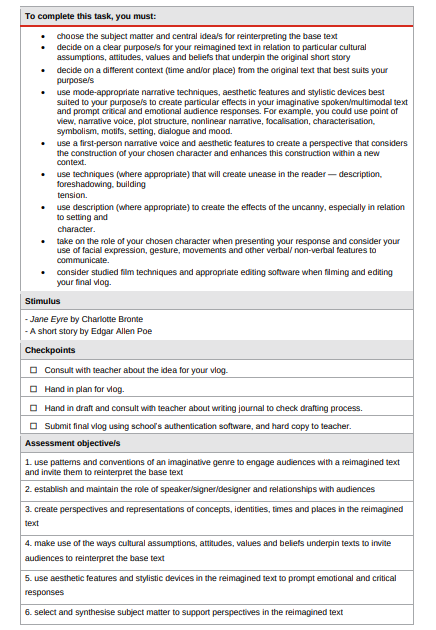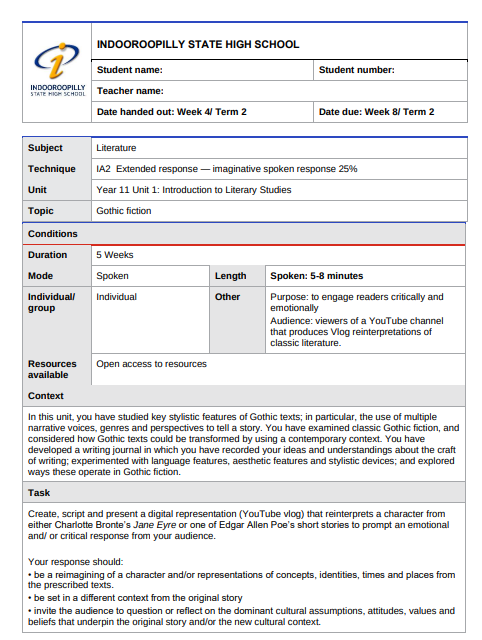To complete this task, you must:
•
choose the subject matter and central ideals for reinterpreting the base text
• decide on a clear purposes for your reimagined text in relation to particular cultural
assumptions, attitudes, values and beliefs that underpin the original short story
•
decide on a different context (time and/or place) from the original text that best suits your
purpose/s
use mode-appropriate narrative techniques, aesthetic features and stylistic devices best
suited to your purpose/s to create particular effects in your imaginative spoken/multimodal text
and prompt critical and emotional audience responses. For example, you could use point of
view, narrative voice, plot structure, nonlinear narrative, focalisation, characterisation,
symbolism, motifs, setting, dialogue and mood.
use a first-person narrative voice and aesthetic features to create a perspective that considers
the construction of your chosen character and enhances this construction within a new
context.
use techniques (where appropriate) that will create unease in the reader-description,
foreshadowing, building
tension.
• use description (where appropriate) to create the effects of the uncanny, especially in relation
to setting and
character.
• take on the role of your chosen character when presenting your response and consider your
use of facial expression, gesture, movements and other verbal/ non-verbal features to
communicate.
• consider studied film techniques and appropriate editing software when filming and editing
your final vlog.
Stimulus
-Jane Eyre by Charlotte Bronte
- A short story by Edgar Allan Poe
Checkpoints
Consult with teacher about the idea for your vlog.
Hand in plan for vlog.
Hand in draft and consult with teacher about writing journal to check drafting process.
Submit final vlog using school's authentication software, and hard copy to teacher.
Assessment objectivels
1. use patterns and conventions of an imaginative genre to engage audiences with a reimagined text
and invite them to reinterpret the base text
2. establish and maintain the role of speaker/signer/designer and relationships with audiences
3. create perspectives and representations of concepts, identities, times and places in the reimagined
text
4. make use of the ways cultural assumptions, attitudes, values and beliefs underpin texts to invite
audiences to reinterpret the base text
5. use aesthetic features and stylistic devices in the reimagined text to prompt emotional and critical
responses
6. select and synthesise subject matter to support perspectives in the reimagined text/nP
INDOOROOPILLY
STATE HIGH SCHOOL
Subject
Technique
Unit
Topic
Conditions
Duration
Mode
Individual/
group
INDOOROOPILLY STATE HIGH SCHOOL
Student name:
Teacher name:
Date handed out: Week 4/ Term 2
5 Weeks
Spoken
Individual
Literature
IA2 Extended response-imaginative spoken response 25%
Year 11 Unit 1: Introduction to Literary Studies
Gothic fiction
Student number:
Length
Other
Open access to resources
Date due: Week 8/ Term 2
Spoken: 5-8 minutes
Purpose: to engage readers critically and
emotionally
Audience: viewers of a YouTube channel
that produces Vlog reinterpretations of
classic literature.
Resources
available
Context
In this unit, you have studied key stylistic features of Gothic texts; in particular, the use of multiple
narrative voices, genres and perspectives to tell a story. You have examined classic Gothic fiction, and
considered how Gothic texts could be transformed by using a contemporary context. You have
developed a writing journal in which you have recorded your ideas and understandings about the craft
of writing; experimented with language features, aesthetic features and stylistic devices; and explored
ways these operate in Gothic fiction.
Task
Create, script and present a digital representation (YouTube vlog) that reinterprets a character from
either Charlotte Bronte's Jane Eyre or one of Edgar Allen Poe's short stories to prompt an emotional
and/ or critical response from your audience.
Your response should:
•be a reimagining of a character and/or representations of concepts, identities, times and places from
the prescribed texts.
• be set in a different context from the original story
• invite the audience to question or reflect on the dominant cultural assumptions, attitudes, values and
beliefs that underpin the original story and/or the new cultural context.




